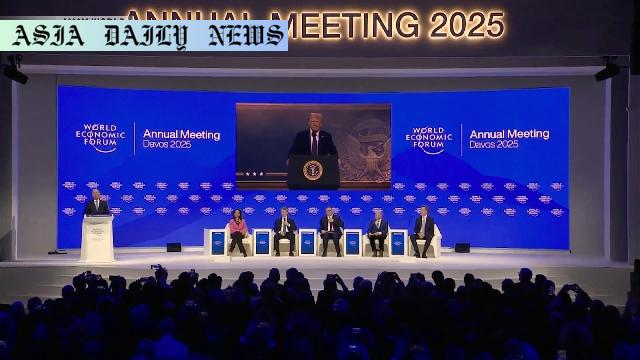Denuclearization: Tremendous amounts of money are being spent on nuclear weapons, and Trump emphasizes the importance of cutbacks.

Trump’s Vision for Denuclearization
US President Donald Trump has expressed a strong commitment toward reducing the global nuclear arsenal during his remarks delivered virtually at the World Economic Forum in Davos, Switzerland. Addressing key world leaders and economic figures, Trump emphasized the alarming amounts of financial resources being allocated worldwide to developing and maintaining nuclear weapons, stating that their destructive power is both immense and concerning.
In his speech, Trump revealed the dialogues he has held with world powers, specifically Russia and China, regarding nuclear weapons reduction. He noted that both Russian President Vladimir Putin and Chinese officials appeared supportive of the concept. This development comes amid a period of heightened global awareness about the extensive nuclear capabilities held by these three nations, highlighting not just the strategic security implications but also the financial and human consequences of prolonged nuclear proliferation.
Dialogue with Russia and China
According to Trump, his recent conversations with Putin have led to a general alignment on the need to scale back nuclear weapons. Trump said, “Putin liked the idea of cutting back on nuclear arms, and so did China.” These talks signify a potentially pivotal shift in US relations with these two countries, especially given the history of suspicion and tension in arms control negotiations.
China’s growing capability and rapid expansion of its nuclear arsenal were also noted by Trump as a factor in driving this dialogue. The inclusion of China in conversations about denuclearization signals an attempt to bring all major powers to the negotiating table, bridging historically challenging gaps between superpowers.
The Economic and Human Case for Denuclearization
One of Trump’s central arguments for nuclear arms reduction stems from its enormous economic burden. He highlighted how countries are “spending tremendous amounts of money” building up these stockpiles, money that could arguably be redirected to stimulating economies and addressing other global priorities such as healthcare, education, and infrastructure development. A world freed from the shadow of nuclear catastrophe would not only improve international security but also yield significant economic dividends.
Additionally, Trump pointed out the psychological toll that the mere existence of nuclear weapons has on humanity, referring to their destructive capability as “depressing.” His rhetoric sought to humanize the issue, turning it into a moral imperative rather than just a geopolitical challenge.
Challenges Ahead
Despite these diplomatic overtures, the path toward denuclearization is fraught with challenges. Historical attempts at arms control have often been undermined by mistrust, uneven enforcement, and shifting geopolitical alliances. Moreover, the practicality of verifying compliance and ensuring mutual reductions without compromising national security will require robust mechanisms and transparent communication.
Furthermore, domestic and international politics could influence these efforts. For instance, hawkish factions within all three nations may resist any reductions, citing national security or strategic deterrence concerns. Balancing these tensions will be key to achieving meaningful progress.
A Global Opportunity
Nonetheless, the potential benefits of nuclear arms reduction are immense. A successful push for denuclearization could establish a precedent for how global superpowers can work jointly on critical issues affecting humanity. It could also signal a new era of diplomacy where economic and political competition exists alongside collective efforts toward peace and security.
Trump’s call for denuclearization demonstrates an aspirational approach that, if executed effectively, could redefine global geopolitics for the better. Whether these ambitions are realized will depend heavily on continued dialogue, cooperation, and the willingness of all stakeholders to prioritize shared humanity over individual power.
Commentary
Trump’s Aspirational Endeavor
President Trump’s remarks on denuclearization mark a significant moment in global diplomacy. The sheer acknowledgment of the issue at a premier global forum like Davos demonstrates the recognition of nuclear arms reduction as a topic that transcends political boundaries.
The Role of Global Collaboration
One of the most striking aspects of Trump’s vision is his focus on collaboration with Russia and China—two nations that have often been portrayed as adversaries in US foreign policy. If successful, this partnership could signify a sea change in how the world’s greatest powers address shared problems. Given the economic and strategic implications of nuclear proliferation, a multilateral approach is both practical and necessary for any meaningful reduction.
Challenges in Execution
However, aspirations do not always translate to impactful actions. Trust, verification, and sustaining mutual interest are essential components to make denuclearization feasible. Historically, these have been areas where even the best negotiations have faltered. Domestic political considerations and public perception may further influence how deeply nations are willing to commit to such agreements.
The Road Forward
Ultimately, Trump’s willingness to address the issue opens the door for further dialogue and imagines a world where cooperation could lead to shared prosperity. It remains to be seen whether this vision will materialize, but the conversation itself is a vital step forward for humanity.


